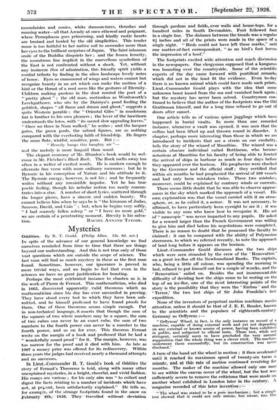Recent Poetry
Japanese Garland. By Edmund Blundell. With decorations
7s. 6d.)
FROM Mr. Siegfried Sassoon we have learned to expect high distinction of manner, and a bitter or angry beauty of matter. In The Heart's Journey he still moves in the brooding way of the lonely spirit ; most of the beauty is now of the softly-communing kind. He seems to summon the darkling dewy dawns of a vanished springtide, seeking to recover in low-toned aubade their lost silvery annunciations :—
"Sing bravely in my heart, you patient birds, Who all this weary winter wait for spring."
The lovesongs have a grave sweetness, even a ceremonial grace. Like Dante and his friends he dares to address his Song as a divine ambassador from "The Paradise of your imperfect lover." In other lyrics, with the fine intensity of convalescent nerves, he breaks the insubstantial bread of beauty—the fugues of Bach, the lamplight on the roof, white flowers beside a book. Though the old violence of attack has passed or paused, there is noble indignation and stabbing pity in "To One in Prison," melancholy contempt over the "peace-complacent stone" of Menin Gate, and a fas- tidious disdain, for which many will thank him, in "When I have heard small talk about great men." In this volume Mr. Sassoon reveals affinities both with the metaphysical and the courtly poets of the seventeenth century. But his originality remains indisputable. He writes from an impassioned experi- ence, and his cadence has the wavelike power which carries the words beyond mere rational significance into the mystery of music. It is aristocratic poetry, for all its compassion ; and the concentrated intellectual ecstasy of the following lyric has greatness in its challenge :—
"In me, past, present, future, meet To hold long chiding conference. My lusts usurp the present tense And strangle Reason in his seat. ,My loves leap through the future's feneo To dance with dream-enfranchised feet.
In me the cave-man clasps the seer, And garlanded Apollo goes Chanting to Abraham's deaf ear. In me the tiger sniffs the rose. Look in my hearts, kind friends, and tremble, Since there your elements assemble."
This is the authentic cry of the Renaissance.
It was an ironic freak of destiny that sent the most home- loving of our modern poets from his "shepherd shires" to the chair of the exotic Lafeadio Hearn in "the bedragoned kingdom" of Japan. In Japanese Garland Mr. Blunden interweaves some of his songs of exile with the singularly sympathetic decorations of Miss Mayo. The result, bound in covers whereon silver fireflies pattern grey bamboo-rods, is a volume covetable by the bibliophile. The poetic content, small in quantity, will deeply interest all those who have been charmed by the poet's English pastoral of dews and rainbows, moondaisies and conies, white damson-trees, thrushes and running water—all that Arcady at ()nee ethereal and poignant, where Persephassa goes pri.mrosing, and kindly rustic hearts are bruised and healed by the old simplicities. This tender muse is too faithful to her native soil to surrender more than her eyes to the brilliant surprises of Japan. The faint inhuman smile of the Buddha disquiets her ; and the frozen ferocity, the Monstrous line implicit in the marvellous symbolism Of the East is not confronted without a shock. Yet, without any insincere elan of admiration, this friendly spirit yields a cordial tribute by finding in the alien landscape lovely notes of home. Eyes so enamoured of wings and waters cannot but recognize beauty in an art which can make the motion of a bird or the thrust of a reed seem like the gestures of Eternity.
• Children making gardens in the dust remind the poet of a ".pretty ghost " ; the old man, motionless as WordsWorth's Leechgatherer, who sits by -the -Dainiyo's pond feeding the goldfish, shapes "all flame and dream and ghost," suggests a quite Western parable'; the "Oriental Giles" in mushroom hat is brother to his own gleaners ; the lover of the hawthorn understands the lotos, with "its sacred slow appealing leaves." "Once we three in Nara walked," he writes ; and the lacquer gates, the green pools, the 'sabred figures, are as nothing compared with the everlasting faith of friendship. He fingers the same flute, wistful, sensitive," pure. But :- "Heavily hangs this haughty air "— and the melody is more languid than usual.
The elegant economy of Mr. Blunden's book would be wel- come in Mr. Fletcher's Black Rock. The Rock melts away too
often in a welter of excited words. He is modern enough to alternate free verse with more ordinary measures ; but he is Byronic in his conception of Nature and his attitude to it, The Byronic energy, however, is not his ; and he frequently writes without any irresistible iinpidse. Yet he has true poetic feeling, though his nebular notion too rarely concen- trates into a star. A number of short lyries, scattered through the longer pieces, have a sincere and sudden beauty. We cannot believe him when he says he is "the kinsman of Judas, Samson, David, and Cain " ; but, when he begins very softly, "I had scarcely fallen asleep" or "I have no more gold," we arc certain of a penetrating moment. Brevity is his salva-







































 Previous page
Previous page